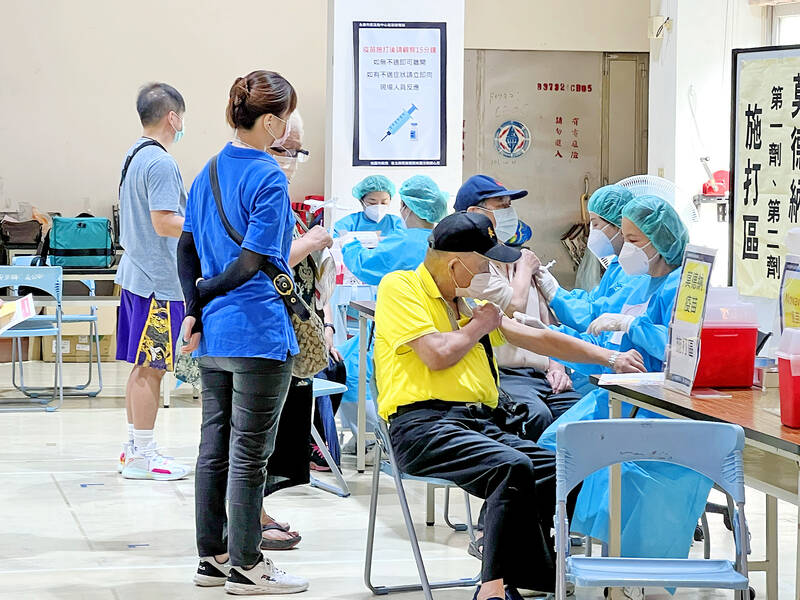The Central Epidemic Command Center (CECC) yesterday reported 46,795 local COVID-19 cases, the highest caseload in 83 days, while the number of daily prescribed antivirals for treating the disease was the highest in 78 days.
Centers for Disease Control (CDC) Deputy Director-General Chuang Jen-hsiang (莊人祥), the CECC’s spokesman, said 46,795 new local infections, 256 imported cases and 17 deaths were confirmed yesterday.
The local caseload is the highest since June 23 and an increase of 28.6 percent compared with Tuesday last week, but the spike might also be partially caused by people waiting to seek medical treatment until after the Mid-Autumn Festival long weekend, Chuang said.

Photo: Chen En-hui, Taipei Times
The most cases were reported in New Taipei City, with 9,618, followed by Taichung with 6,081, Taipei with 5,619, Taoyuan with 4,519, Kaohsiung with 3,928, Tainan with 3,028, Changhua County with 2,217, Hsinchu County with 1,329, Pingtung County with 1,304, Yunlin County with 1,157, Miaoli County with 1,156, Yilan County with 1,059, and 10 other administrative regions with fewer than 1,000 cases each.
CDC Deputy Director-General Philip Lo (羅一鈞), deputy head of the CECC’s medical response division, said the 17 people who died were aged 50 or older and had chronic diseases.
Twelve people among them had not had a COVID-19 booster shot, Lo said.
The number of oral antivirals prescribed on Monday to treat COVID-19 increased to 8,816 courses — 6,853 of Paxlovid and 1,963 of molnupiravir, he said, adding that it is the highest daily number since June 27.
There were 14,427 reported cases of reinfection as of Monday, he said, adding that people who are diagnosed as being reinfected can receive prescription antiviral drugs or a traditional herbal formula known as Taiwan Chingguan Yihau, or NRICM101, if they meet the prescription criteria, Lo said.
The antiviral drugs and the formula should not be taken at the same time to avoid unwanted interactions between them, he said.
The two definitions of COVID-19 reinfection are “testing positive with an antigen test, a rapid nucleic acid amplification test (NAAT), or a polymerase chain reaction (PCR) test with a cycle threshold (Ct) value lower than 27, and an onset of worsened symptoms within one to three months since the previous onset or testing date of COVID-19 infection” and “testing positive with an antigen test, a NAAT or a PCR test with a Ct value lower than 30, asymptomatic or symptomatic, at least three months after previous onset or testing date of the COVID-19 infection,” he said.
The meaning of “worsened symptoms” includes the onset of new symptoms, such as a fever or respiratory symptoms; worsening of chronic conditions; or being asymptomatic in the previous infection and subsequently having symptoms, he said.
If a previously infected person has new or worse symptoms, and tests positive again with a rapid test kit, they can seek medical attention through telemedicine or an in-person clinical visit, and be diagnosed and reported as a reinfection case by a doctor, he said.
The doctor can also prescribe oral antivirals or other drugs, so people should not rush to a hospital to get a PCR test if they suspect themselves to be reinfected, Lo said, adding that the procedure of receiving a home isolation notice is the same as for a first infection.

Taiwan has received more than US$70 million in royalties as of the end of last year from developing the F-16V jet as countries worldwide purchase or upgrade to this popular model, government and military officials said on Saturday. Taiwan funded the development of the F-16V jet and ended up the sole investor as other countries withdrew from the program. Now the F-16V is increasingly popular and countries must pay Taiwan a percentage in royalties when they purchase new F-16V aircraft or upgrade older F-16 models. The next five years are expected to be the peak for these royalties, with Taiwan potentially earning

STAY IN YOUR LANE: As the US and Israel attack Iran, the ministry has warned China not to overstep by including Taiwanese citizens in its evacuation orders The Ministry of Foreign Affairs (MOFA) yesterday rebuked a statement by China’s embassy in Israel that it would evacuate Taiwanese holders of Chinese travel documents from Israel amid the latter’s escalating conflict with Iran. Tensions have risen across the Middle East in the wake of US and Israeli airstrikes on Iran beginning Saturday. China subsequently issued an evacuation notice for its citizens. In a news release, the Chinese embassy in Israel said holders of “Taiwan compatriot permits (台胞證)” issued to Taiwanese nationals by Chinese authorities for travel to China — could register for evacuation to Egypt. In Taipei, the ministry yesterday said Taiwan

Taiwan is awaiting official notification from the US regarding the status of the Agreement on Reciprocal Trade (ART) after the US Supreme Court ruled US President Donald Trump's global tariffs unconstitutional. Speaking to reporters before a legislative hearing today, Premier Cho Jung-tai (卓榮泰) said that Taiwan's negotiation team remains focused on ensuring that the bilateral trade deal remains intact despite the legal challenge to Trump's tariff policy. "The US has pledged to notify its trade partners once the subsequent administrative and legal processes are finalized, and that certainly includes Taiwan," Cho said when asked about opposition parties’ doubts that the ART was

If China chose to invade Taiwan tomorrow, it would only have to sever three undersea fiber-optic cable clusters to cause a data blackout, Jason Hsu (許毓仁), a senior fellow at the Hudson Institute and former Chinese Nationalist Party (KMT) legislator, told a US security panel yesterday. In a Taiwan contingency, cable disruption would be one of the earliest preinvasion actions and the signal that escalation had begun, he said, adding that Taiwan’s current cable repair capabilities are insufficient. The US-China Economic and Security Review Commission (USCC) yesterday held a hearing on US-China Competition Under the Sea, with Hsu speaking on